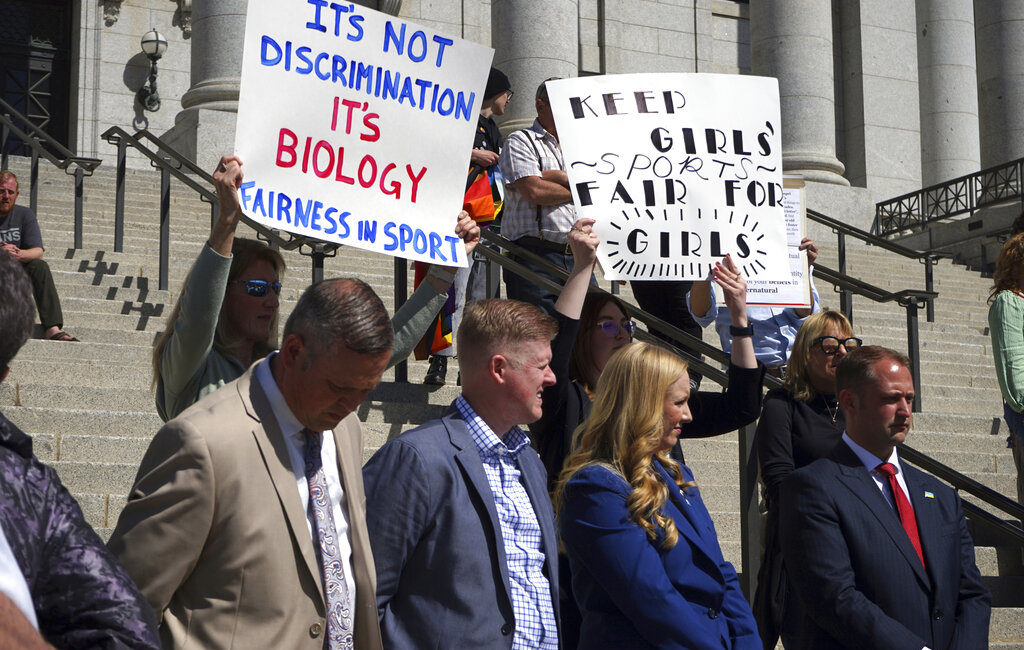Utah officials secretly investigated female high school athlete’s gender

SALT LAKE CITY (AP) — A Utah high school athletics association secretly investigated a female athlete — without telling her or her parents — after receiving complaints from the parents of two girls she had defeated in competition questioning whether the girl was transgender.
The Salt Lake Tribune reported Thursday that the Utah High School Activities Association and the girl’s high school determined she indeed was female after poring through her school records dating back to kindergarten.
Association spokesman David Spatafore told lawmakers that the girl and her family weren’t told of the investigation to spare them embarrassment and “to keep the matter private,” the Tribune reported.
The revelation came as at least 12 Republican-led states — including Utah — have passed laws banning transgender women or girls in sports. Supporters of the bans say transgender girls have an unfair advantage because they were born as stronger males and could deny girls places on sports teams.
There have been almost no cases of potential competitive advantages in K-12 sports in states passing the bans, including Utah. The state’s ban is being challenged in state court.
Spatafore told a legislative hearing on transgender athletes Wednesday that the parents of the second- and third-place finishers in a competition last year filed a complaint with the association after the girl won first place in an event “by a wide margin,” the Tribune said.
The girl’s school reviewed her high school record and determined she was registered as female. The Utah high school association asked the school to “double check,” Spatafore said, and officials contacted her middle and elementary schools to review files.
“The school went back to kindergarten,” Spatafore said, “and she’d always been a female.”
Spatafore declined to reveal the student’s grade, school or sport to protect her identity. He said the student and her family were not told about the investigation because it might be offensive to them and that the parents would have been contacted “if needed.”
Spatafore also said the association has looked into other complaints involving transgender athletes in its efforts to comply with the Utah law, which went into effect in July. Some complaints include “when an athlete doesn’t look feminine enough,” he said. None of the complaints have been verified.
Lawmakers didn’t question the process during the hearing, the Tribune reported.
Sue Robbins, of the Transgender Advisory Council of Equality Utah, said the association should publicly adopt a policy spelling out how and when it may investigate student records.
“Where does the UHSAA get their authority to go investigate?” Robbins said. “We warned about this being a possibility, that everyone would accuse everyone who is successful of being transgender. … It becomes about judging women’s bodies. And no body is safe.”
Utah Gov. Spencer Cox, a Republican whose veto of the ban earlier this year was overridden by the Legislature, said Thursday that the parents’ complaint about the girl who was investigated had crossed a line.
“My goodness, we’re living in this world where we’ve become sore losers, and we’re looking for any reason why our kid lost,” he said. He said he supports fairness in sports but that “making up allegations like that are pretty disturbing to me.”
Before the ban, Utah had one registered transgender female athlete competing last year on a high school girls’ team, Spatafore said.
In a lawsuit, three transgender girls and their parents claim the outright ban passed by the Republican-majority Utah Legislature wrongly keeps their children from participating in the sports.
Their attorneys argue it violates provisions of the state constitution that prohibit discrimination and guarantee equal rights and due process.
